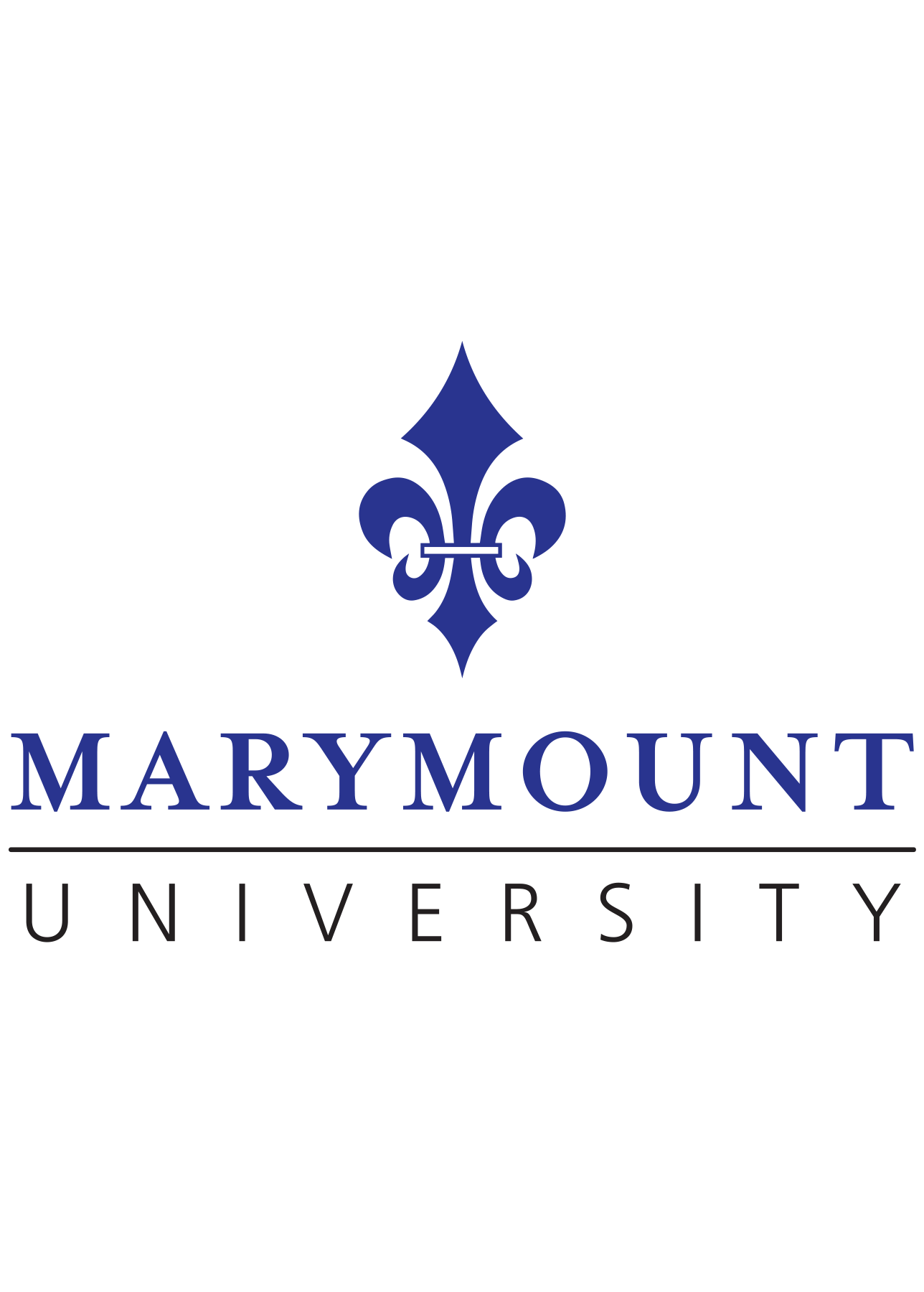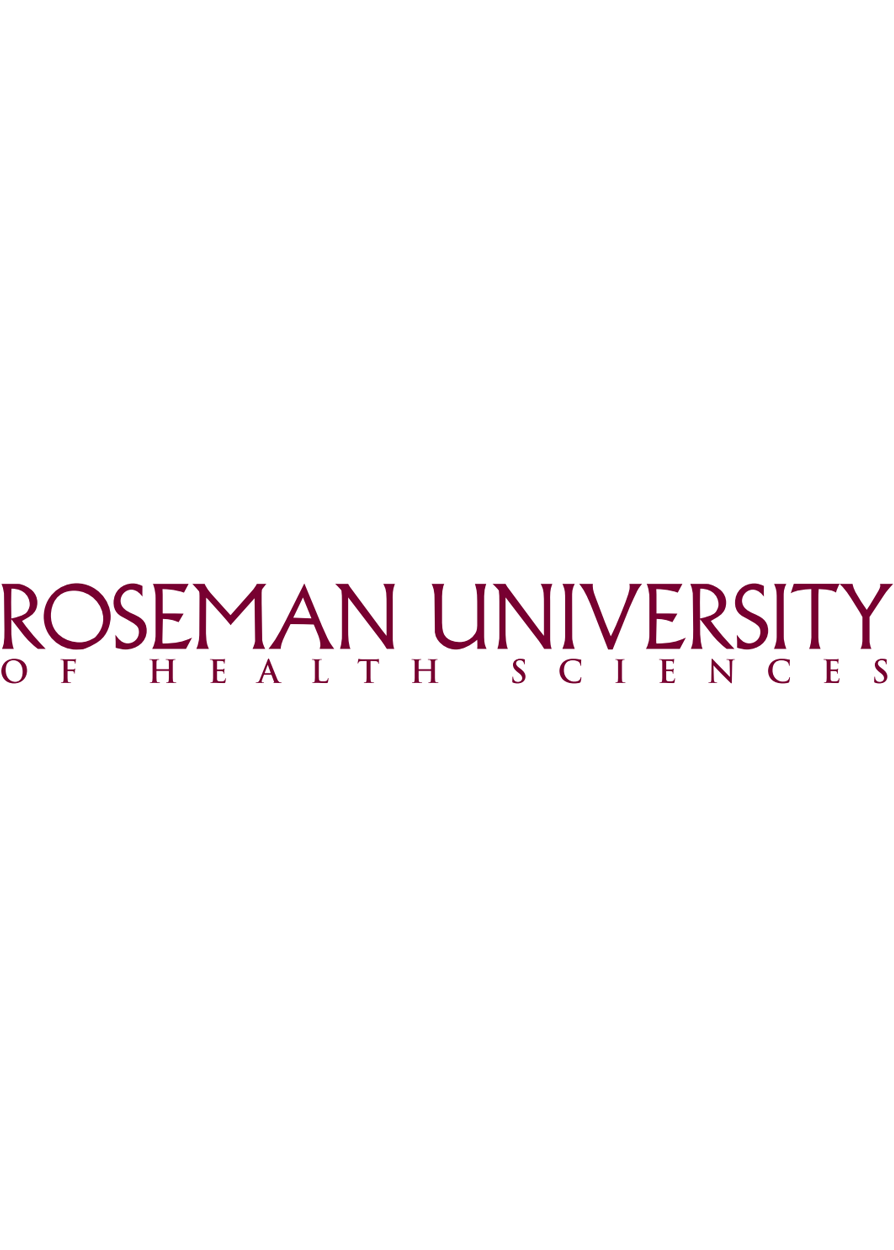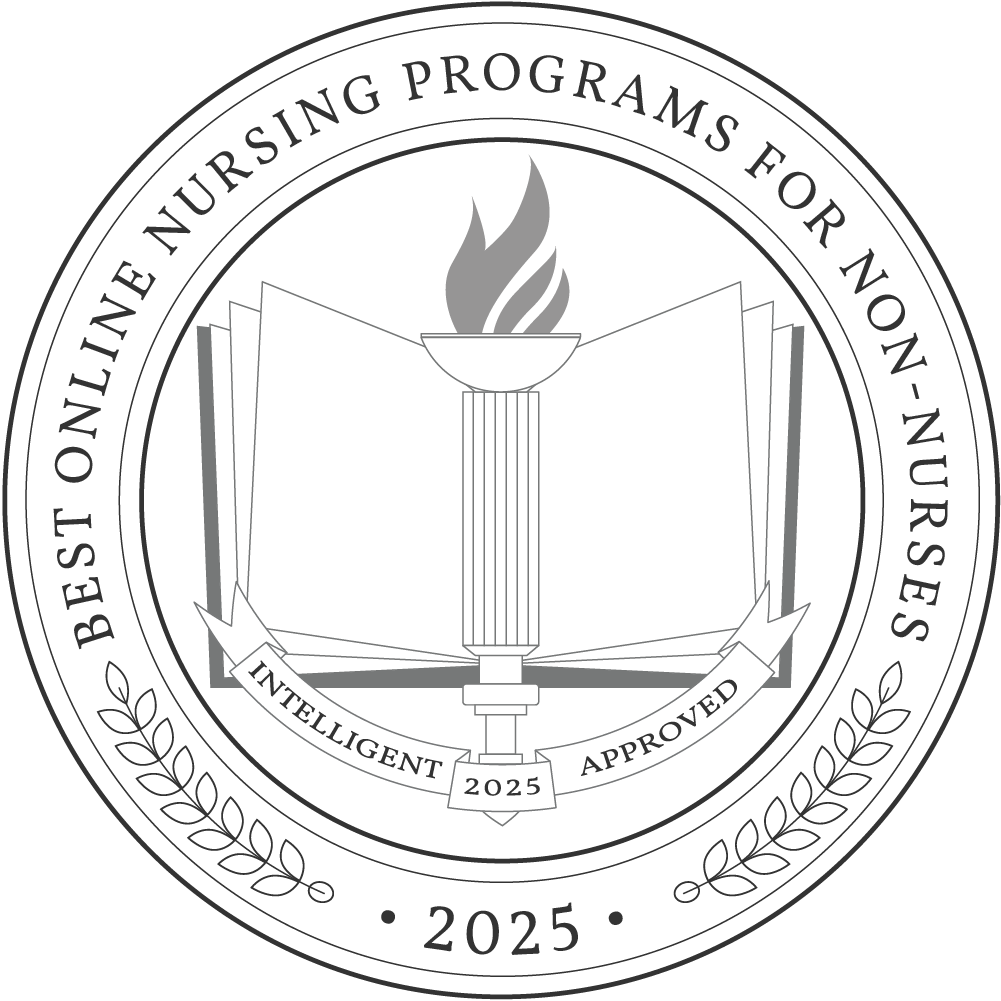Nursing is a fast-growing field that attracts individuals from all educational and professional backgrounds who want to serve their communities by caring for others. According to the Bureau of Labor Statistics (BLS), employment of registered nurses (RNs) is expected to increase by 6% through 2032. The median annual wage for nurses is $86,070, with top earners making upwards of $132,000 per year.
Because nurses must have specialized knowledge and skills to practice, a Bachelor of Science in Nursing (BSN) is a standard requirement for employment. There are several pathways to earning this degree. For individuals who already have a bachelor’s degree in a different field, an accelerated BSN program is an ideal option. This type of degree program allows non-nurses to complete the coursework and clinical experiences they need for licensure and employment in a relatively short time frame.
To help students find the right degree program, Intelligent.com compiled this list of the best online nursing degree programs for non-nurses. This article also explores what students can expect from this program and provides insight into choosing a nursing degree program from Blanca Villagomez, a program coordinator and counselor at UC-Irvine.
Why Trust Us
The Intelligent.com Higher Education Team is dedicated to providing students with independent, equitable school and program rankings and well-researched resources. Our expert-driven articles cover topics related to online colleges and programs, paying for school, and career outlooks. We use data from the U.S. Department of Education’s College Scorecard, the National Center for Education Statistics, and other reputable educational and professional organizations. Our academic advisory team reviews content and verifies accuracy throughout the year for the most current information. Partnerships do not influence rankings or editorial decisions.
- Analyzed over 2,000 national, accredited, and nonprofit colleges and universities
- 800+ rankings pages are reviewed and updated yearly
- Content is informed by reputable sources, surveys, and interviews with academic advisors and other experts
- Over 100 data points are reviewed for accuracy and quality throughout the year, including sources
How we rank schools
Our list features the best online Nursing degree programs at top colleges nationwide. Each school featured is a nonprofit, accredited institution — either public or private — with a high standard of academic quality for post-secondary institutions.
We evaluated each school’s program on tuition costs, admission, retention and graduation rates, faculty, reputation, and the student resources provided for online students. We collected data from trusted sources like the National Center for Education Statistics, individual school and program websites, school admissions counselors, and other data sources. Then, we calculated the Intelligent Score on a scale of 0 to 100 based on the following criterion:
Academic Quality:
- Admission rate versus enrollment rate
- Retention rate of students who return after year one
- Accreditation status (regional and programmatic)
- Nonprofit status, both private and public institutions
Graduation Rate
- Overall graduation rate
- Total number of currently enrolled students, including diversity metrics
- Student-to-faculty ratio
Cost and ROI
- In-state and out-of-state per-credit tuition rates and fees
- Required credits to graduate
- Earning potential after graduation
- Availability of federal student loans, scholarships, and other financial aid options
Student Resources
- Available student services for online-only and hybrid programs
- On-campus amenities like tutoring centers and the number of libraries
Read more about our ranking methodology.
Best 7 Accredited Online Nursing Degree Programs for Non-Nurses
FiltersInstitution Type
Status
- Intelligent Score
- Alphabetically By University Name
- Acceptance Rate
- Enrollment
- In-state Graduate Tuition
- Out-of-state Graduate Tuition
- In-state Undergraduate Tuition
- Out-of-state Undergraduate Tuition

University of Wisconsin Oshkosh
Intelligent Score: 97.57In-state: $9,273
Out-of-state: $37,161
In-state: $10,728
Out-of-state: $10,728
SAT: 1260-1460
ACT: 27-32
Resident: $233
Non-Resident: $311
Online
Commission on Collegiate Nursing Education
120

Kent State University
Intelligent Score: 96.84In-state: $10,810
Out-of-state: $19,686
In-state: $11,766
Out-of-state: $11,766
SAT: 1020-1210
ACT: 20-26
$485
Online
Commission on Collegiate Nursing Education
120- 122

Herzing University
Intelligent Score: 96.84In-state: $34,284
Out-of-state: $34,284
In-state: $31,984
Out-of-state: $31,984
SAT: 1,275 or better
ACT: 17 or better
$755
Online
Commission on Collegiate Nursing Education
120

Wilkes University
Intelligent Score: 95.53In-state: $36,888
Out-of-state: $36,888
In-state: $26,400
Out-of-state: $26,400
SAT: 1040-1230
ACT: 20-26
$551
Online
Commission on Collegiate Nursing Education
120

Marymount University
Intelligent Score: 95.15In-state: $33,200
Out-of-state: $33,200
In-state: $19,620
Out-of-state: $19,620
SAT: 970-1170
ACT: 20-28
$1,246
Online
Commission on Collegiate Nursing Education
120

Methodist College
Intelligent Score: 95.03In-state: $46,274
Out-of-state: $46,274
In-state: $49,826
Out-of-state: $49,826
SAT: 980 or higher
ACT: 19 or higher
$677
Online
Commission on Collegiate Nursing Education
120-122

Roseman University of Health Sciences
Intelligent Score: 93.63In-state: $92,705
Out-of-state: NA
In-state: $35,300
Out-of-state: $35,300
SAT: NA
ACT: NA
$515
Online, On-Campus
Commission on Collegiate Nursing Education
120
What You Can Expect From an Online Nursing Degree Program for Non-Nurses
Online nursing degree programs for non-nurses, commonly known as accelerated BSN programs, are designed for students with bachelor’s degrees in a non-nursing field. Coursework typically consists of foundations of professional nursing, clinical nursing skills, microbiology, anatomy and physiology, health assessment, research, healthcare policy and advocacy, emergency care, clinical nursing leadership, and more.
Hands-on clinical experiences are also a crucial part of nursing education. Even in online programs, students participate in in-person simulation labs, practicums, and clinical rotations to help them develop their assessment and treatment skills. Requirements for the number of clinical hours students must complete vary based on their current education and experience level and the state’s licensing regulations, but they typically range from 300-800 hours total. Students can complete their clinical hours in hospitals, urgent care clinics, community health centers, outpatient medical facilities, and more.
For students enrolling in an accelerated BSN program in pursuit of a registered nurse (RN) license, it’s important to confirm that the program they select meets the requirements for the National Council Licensure Exam (NCLEX), as well as their state’s requirements for licensure.
How a program is delivered will also impact what students can expect. Many programs are offered asynchronously, where students don’t have scheduled class meetings. Instead, students access and complete lessons and assignments on their own time. Students who want a more traditional experience may seek out a synchronous program where classes are conducted live at pre-scheduled times, with students attending virtually from wherever they’re located. Depending on the program, students may be able to enroll full-time or part-time.
Potential courses you’ll take in an online nursing degree program for non-nurses
- Introduction to Professional Nursing and Scholarship: Provides an introduction to the professionalism and values of nursing, with a historical perspective used to provide background for subsequent study of contemporary nursing practice and research.
- Health Assessment: Prepares students to perform comprehensive health assessments of adult clients, with topics including communication and documentation, ethical, spiritual and cultural considerations, and risk evaluation related to environmental, genetic and lifestyle factors.
- Mental Health Promotion and Illness Management: Focuses on mental health promotion and the care of clients with acute and chronic mental illness, and addresses primary, secondary and tertiary prevention methods.
- Research and Evidence-Based Practice: Introduces students to the process of systematic investigation necessary for the continued development of the body of knowledge that forms the basis of nursing practice. Learners become familiar with the research process, characteristics of practice-based research, and methodologies appropriate to the investigation of researchable nursing-practice problems.
What Can I Do With an Online Nursing Degree?
The most common career path for individuals who earn a BSN is becoming a registered nurse (RN). RNs work in various healthcare settings, including medical and psychiatric hospitals, urgent care centers, inpatient and outpatient medical facilities, rehabilitation centers, schools, and more. They are often part of a care team, working alongside physicians and specialists to plan and administer patient care.
Depending on the student’s specific interests and goals, they may choose to specialize in a particular area of nursing. This may mean working with a specific patient population, such as neonatal, pediatric, adult, or gerontological care, or in a particular area of medicine, such as oncology, cardiology, or psychiatric care.
A BSN also provides a solid foundation for further study, either in advanced nursing practice as a nurse practitioner or for non-clinical roles such as healthcare administration or health informatics.
Career outlook
- Registered nurses: Provide and coordinate patient care, educate patients and the public about various health conditions, and provide advice and emotional support to patients and their families.
- Median annual salary: $86,070
- Projected employment growth (through 2032): 6%
- New jobs projected: 194,500 per year
- Health education specialists: Teach people about behaviors that promote wellness by assessing the health needs of individuals and communities, developing programs, materials, and events to teach people about health topics, and evaluating the effectiveness of programs and educational materials
- Median annual salary: $62,860
- Projected employment growth (through 2032): 7%
- New jobs projected: 6,700 per year
- Nurse practitioners: After earning a master’s degree, RNs can obtain licensure as nurse practitioners or advanced practice registered nurses. These individuals serve as primary and specialty care providers, delivering advanced nursing services to patients and their families. In most states, they can prescribe medications, order medical tests, and diagnose health problems.
- Median annual salary: $126,260
- Projected employment growth (through 2032): 40%
- New jobs projected: 31,900 per year
How to Choose an Online Nursing Degree Program for Non-Nurses
Clarify your goals and priorities
Clarifying your career goals and logistical needs early on can help make your search for an online nursing degree program as smooth and efficient as possible.
Review the licensure requirements for the state where you plan to practice to ensure you’re considering programs meeting eligibility criteria. Reflect on whether a specific patient population or area of medicine interests you. This can help guide you to programs that offer electives, specializations, and clinical experiences in your area of interest.
Another parameter to set at this stage is what type of program you want, including synchronous or asynchronous content delivery and full- or part-time enrollment. Accelerated online BSN programs often operate asynchronously, allowing students to complete coursework according to their own schedules. However, Villagomez notes that students should think carefully about whether an accelerated program fits their lifestyle and learning preferences.
“There are no shortcuts with this route,” she says. “Students are expected to complete the same amount of work in a shorter time frame than a traditional BSN, so they require a higher investment of time and energy. I usually only recommend them to individuals with strong time management skills, dedication, and discipline.”
Research schools and programs
Once you have an idea of the type of program you’re seeking, you can begin exploring your options to determine which school is the right fit for you.
A key piece of information to confirm when researching schools is whether they have institutional and programmatic accreditation.
“With institutional accreditation, colleges and universities are evaluated as a whole and must meet several quality standards to receive regional or national accreditation,” Villagomez says. “Meanwhile, programmatic accreditation evaluates the quality and legitimacy of the specific degree programs. Attending a non-accredited college can negatively impact future post-graduate opportunities, including employment, licensure, and graduate programs.”
Nursing degree programs are accredited by the Accreditation Commission for Education in Nursing (ACEN), while schools are accredited by agencies recognized by the Council on Higher Education Accreditation (CHEA).
Other essential information students should collect includes:
- What the curriculum consists of, including core courses, electives, and specialization options
- How courses are delivered (synchronously or asynchronously)
- Clinical rotation requirements
- Faculty credentials
- Available support services for online students, including tutoring, counseling, tech support, library resources, and networking opportunities
- Program costs, including fees
Students can typically find this information on a school’s website or by contacting the school’s admissions office. Attending virtual open houses or information sessions can also help students gain valuable insight into programs and their suitability.
Prepare for tests and applications
“After researching degree programs and schools, students should have a strong sense of the admission requirements,” Villagomez says. “Requirements typically vary by school, so students must stay organized with a comprehensive and detailed checklist to track their progress, submit all required materials, and meet deadlines.”
A standard application for a nursing degree for non-nurses consists of:
- Completed application and required fees
- Official transcripts showing completion of a bachelor’s degree
- Letters of recommendation
- Personal statement or essay
- Resume or CV
- SAT or ACT scores
Determine how you’ll pay for your degree
While researching schools, get as much information as possible about the program’s full cost (including fees) and the financial aid options available to you.
There are two forms of financial aid — need-based and merit-based. For need-based aid, students must complete the Free Application for Federal Student Aid (FAFSA). Need-based aid includes federal student loans, grants, scholarships, work-study, and assistantships.
Schools and external organizations will also consider students for merit-based aid like scholarships, grants, and fellowships based on their achievements and aptitudes.
If you plan to work while earning an online nursing degree, inquire about employer tuition assistance benefits to help subsidize your education. Active-duty military members and veterans may be able to get discounted tuition or use GI Bill benefits to pay for their degrees.
Online Nursing Degree Program Frequently Asked Questions
Should I get a nursing degree online or in person?
Many students opt for an online nursing degree program because they are looking for flexibility. These programs are often geared toward those with daytime jobs or family commitments, allowing students to complete coursework and assignments asynchronously according to their own availability.
However, students in these types of programs should keep in mind that they often require a higher level of motivation and dedication than traditional in-person programs. Students must be prepared to dedicate time and effort to their studies to stay on track and get the most out of their program.
It’s also important to consider learning styles and preferences. Online courses are typically delivered through pre-recorded lectures, videos, and reading assignments, which may not be a good fit for students who learn best through hands-on assignments and real-time interaction with instructors and classmates.
How much does an online nursing degree program cost?
The National Center for Education Statistics (NCES) reports that for the 2022-23 academic year, the average annual tuition for undergraduate programs was $9,750 at public institutions and $38,421 at private colleges.
Many factors influence how much students will pay for an online nursing degree. For example, students attending a public institution should note whether the school has different tuition rates for in-state and out-of-state students or if distance learners all pay the same tuition rate. Many schools charge additional fees for virtual classroom technology, labs, background checks, or other resources, which students must factor into their budgets.
Nursing students should also consider the financial impact of clinical rotations. This may mean taking time off from their current jobs or budgeting for transportation expenses to their clinical site, such as gas, parking, or public transportation.
Students should always consult a financial aid counselor for the most accurate information about program costs and payment options.
How long does it take to earn an online nursing degree?
Because nursing degrees for non-nurses are designed for students who already hold a bachelor’s degree, they require fewer credits than traditional BSN programs. Most accelerated BSNs require 48-70 credits and can be completed in 12-18 months of full-time study. Students who enroll on a part-time basis may take additional time to complete their degree. For specific information on program completion time, students should consult with an admissions counselor or program representative.
Is an online nursing degree worth it?
“Earning an online nursing degree can be a convenient and flexible way to pursue higher education,” Villagomez says. “However, the value of an online degree can depend on various factors, such as the reputation of the school and the program, student support services, the accreditation of the degree, and the specific career or educational path students are pursuing.”
From a career perspective, the demand for nurses is expected to continue steadily through the next decade. This is driven by an increase in the elderly population, as well as a need to replace RNs who retire, switch careers, or move to advanced positions. There will be an average of 194,500 new openings for RNs every year through 2032, the BLS reports.
The pay for RNS can vary widely based on setting and location. The median annual salary for RNS in 2023 was $86,070, with the lowest 10% of earners making less than $63,720 per year. In recent years, nurses and healthcare workers throughout the U.S. have taken action, including striking, to demand better pay and working conditions amid changes in the healthcare industry.
Read More about Online Nursing Degrees
Best Accelerated Online Nursing Degree Programs
Best One-Year Online Nursing Degree Programs


